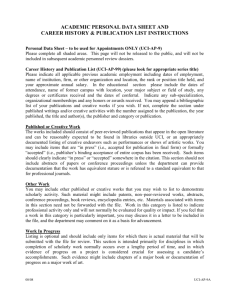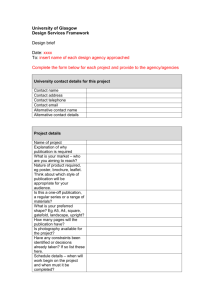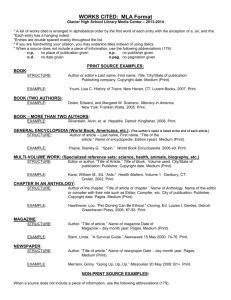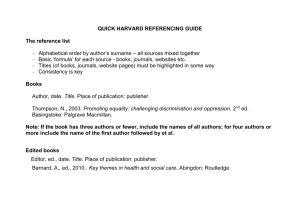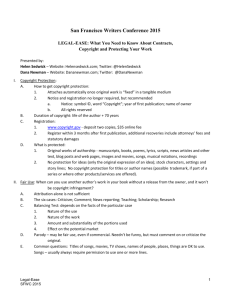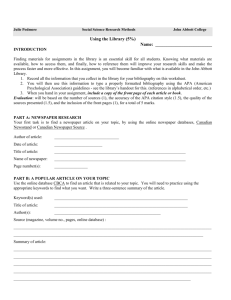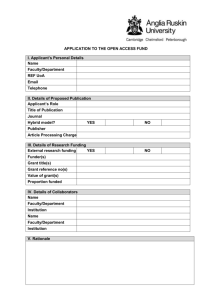Chicago Referencing Style - University College Dublin
advertisement
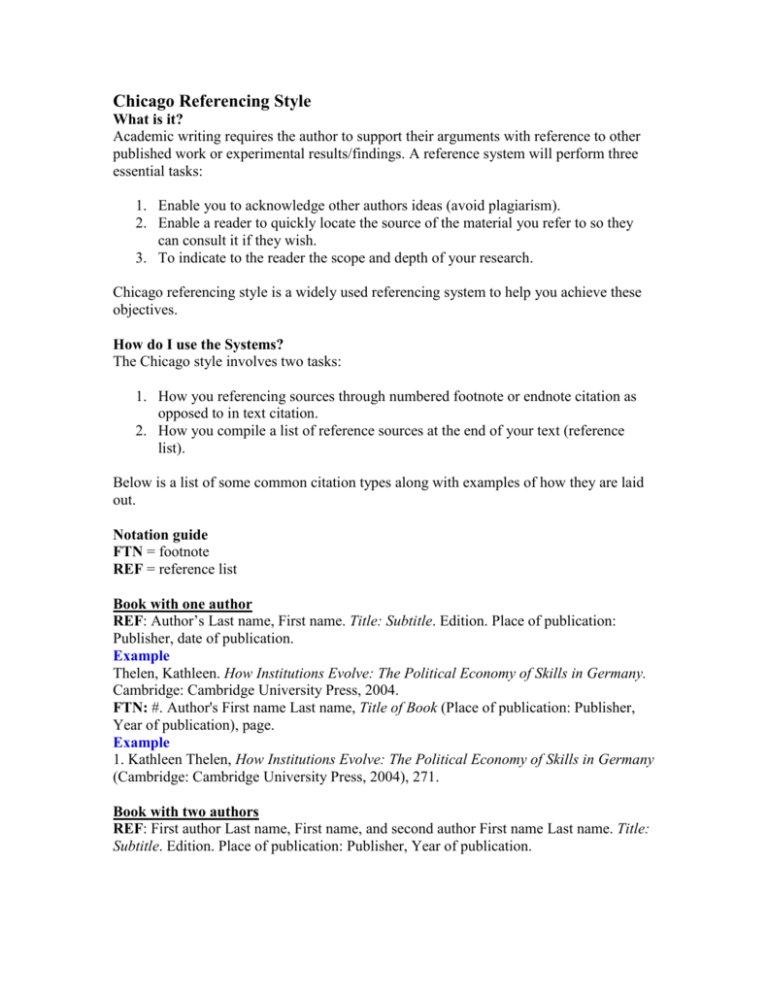
Chicago Referencing Style What is it? Academic writing requires the author to support their arguments with reference to other published work or experimental results/findings. A reference system will perform three essential tasks: 1. Enable you to acknowledge other authors ideas (avoid plagiarism). 2. Enable a reader to quickly locate the source of the material you refer to so they can consult it if they wish. 3. To indicate to the reader the scope and depth of your research. Chicago referencing style is a widely used referencing system to help you achieve these objectives. How do I use the Systems? The Chicago style involves two tasks: 1. How you referencing sources through numbered footnote or endnote citation as opposed to in text citation. 2. How you compile a list of reference sources at the end of your text (reference list). Below is a list of some common citation types along with examples of how they are laid out. Notation guide FTN = footnote REF = reference list Book with one author REF: Author’s Last name, First name. Title: Subtitle. Edition. Place of publication: Publisher, date of publication. Example Thelen, Kathleen. How Institutions Evolve: The Political Economy of Skills in Germany. Cambridge: Cambridge University Press, 2004. FTN: #. Author's First name Last name, Title of Book (Place of publication: Publisher, Year of publication), page. Example 1. Kathleen Thelen, How Institutions Evolve: The Political Economy of Skills in Germany (Cambridge: Cambridge University Press, 2004), 271. Book with two authors REF: First author Last name, First name, and second author First name Last name. Title: Subtitle. Edition. Place of publication: Publisher, Year of publication. Example Gourevitch, Peter and James Shinn. Political Power and Corporate Control: The New Global Politics of Corporate Governance. New Jersey: Princeton University Press, 2005. FTN: #. First author First name Last name and second author First name Last name, Title of Book (Place of publication: Publisher, Year of publication), Page. Example 2. Peter Gourevitch and James Shinn. Political Power and Corporate Control: The New Global Politics of Corporate Governance. (New Jersey: Princeton University Press, 2005), 200. Book with more than three authors REF: First author Last name, First name, et al. Title: Subtitle. Edition. Place of publication: Publisher, Year of publication. Example Sheehan, James, et al. German History 1770-1866. Oxford: Clarendon Press, 1989. FTN: #. First author First name Last name et al., Title of Book (Place of publication: Publisher, Year of publication), Page. Example: 3. James Sheehan et al., German History 1770-1866 (Oxford: Clarendon Press, 1989), 101. Book with a corporate author REF: Organisation. Title. Place of publication: Publisher, Year of publication. Example World Bank. Strategies for Sustainable Financing of Secondary Education in SubSaharan Africa. Washington, D.C.: World Bank, 2008. FTN: #. Organisation. Title (Place of publication: Publisher, Year of publication), page. Example 4. World Bank. Strategies for Sustainable Financing of Secondary Education in SubSaharan Africa (Washington, D.C.: World Bank, 2008), 11. Book with an editor REF: Editor(s) Last name, First name and last editor First name Last name, eds. Title. Place of Publication: Publisher, Year of publication. Example: Colhoun, Craig and Brian S. Turner, eds. The Sage Handbook of Sociology. London: Sage, 2005. FTN: #. Editor(s) First name Last name, eds, Title (Place of Publication: Publisher, date of publication). Example: 5. Craig Colhoun and Brian S. Turner, eds, The Sage Handbook of Sociology (London: Sage, 2005). Chapter in an edited book REF: Author(s) Last name, First name and last author First name Last name. "Title of chapter". In Book Title, edited by editor (s) First name Last name, Pages. Place of Publication: Publisher, Year of publication. Example Sheringham, Michael. "Archiving". In Restless Cities, edited by Matthew Beaumont and Gregory Dart, 10 – 24. London: Verso, 2010. FTN: #. Author(s) First name Last name, "Title of chapter," in Book Title, eds. Editor(s) First name Last name (Place of Publication: Publisher, Year of publication), Page. Example 6. Michael Sheringham, "Archiving". In Restless Cities, eds. Matthew Beaumont and Gregory Dart, (London: Verso, 2010), 9. Journal article - print REF: Author(s) Last name, First name and last author First name Last name. "Title of Article". Journal Title Volume, Issue no (Year): Pages. Example Barber, Marcus. "Global Warming and the Political Ecology of Health: Emerging Crises and Systemic Solutions." The Australian Journal of Anthropology 21, no 3 (2010): 390 – 391. FTN: #. Author(s) First name Last name, "Title of Article". Journal Title Volume, Issue no (Year): Page. Example 7. Marcus Barber, "Global Warming and the Political Ecology of Health: Emerging Crises and Systemic Solutions." The Australian Journal of Anthropology 21, no 3 (2010): 390. Journal article - electronic REF: Author(s) Last name, First name and last author First name Last name, Article title," Journal title Volume, Issue (Year): Pages. Accessed Month Day, Year. URL. Example Testa, Bernard and Lamont B. Kier. "Emergence and Dissolvence in the SelfOrganisation of Complex Systems." Entropy 2, no.1 (March 2000):1-25. Accessed November 21, 2005. http://www.mdpi.org/entropy/papers/e2010001.pdf. FTN: #. Author(s) First name Last name, "Article title," Journal title Volume, Issue no (Year): Page, accessed Month Day, Year. URL. Example 8. Bernard Testa and Lamont B. Kier, "Emergence and Dissolvence in the SelfOrganisation of Complex Systems." Entropy 2, no.1 (March 2000): 20, accessed November 21, 2005, http://www.mdpi.org/entropy/papers/e2010001.pdf. Newspaper article - print REF: Author(s) Last name, First name and last author First name Last name. “Article title.” Newspaper, Month Day , Year. Example Oliver, Emmet. "Aer Lingus to Strengthen Fleet." Irish Times, February 10, 2006. FTN: #. Author(s) First name Last name, “Article title,” Newspaper, Month Day, Year, Page. Example 9. Emmet Oliver, "Aer Lingus to Strengthen Fleet," Irish Times, February 10, 2006, 14. Newspaper article – online REF: Author(s) Last name, First name and last author First name Last name. “Article title.” Newspaper, Day Month, Year published. Accessed Month Day, Year. URL. Example Kelly, Morgan. “Burden of Irish Debt Could Yet Eclipse that of Greece.” Irish Times, May 22, 2010. Accessed May 4, 2011. http://www.irishtimes.com/newspaper/opinion/2010/0522/1224270888132.html. FTN: #. Author(s) First Name Last name, “Article title.” Newspaper, Day Month, Year published, accessed Day Month, Year, URL. Example Morgan Kelly, “Burden of Irish Debt Could Yet Eclipse that of Greece.” Irish Times, May 22, 2010, accessed May 4, 2011, http://www.irishtimes.com/newspaper/opinion/2010/0522/1224270888132.html. Website/ page on a website REF: “Title of webpage." Website name. Last modified date, year. URL. Example “Google Privacy Policy.” Google. Last modified March 11, 2009. http://www.google.com/intl/en/privacy/ FTN: #. “Title of webpage," Website name, Last modified: date, year. URL. Example 10. “Google Privacy Policy,” Google, Last modified March 11, 2009, http://www.google.com/intl/en/privacy/ Blog Generally, blog entries and comments are cited only as notes. FTN: #. Author(s) First name Last name, "Title of Post," Name of Blog, Month Day, Year, URL. Example 11. Brendan Walsh, "Lorenzo Bini Smaghi on the Impact of Basel III," Irish Economy, April 2, 2011, http://www.irisheconomy.ie/index.php/2011/04/02/lorenzo-bini-smaghion-the-impact-of-basel-iii/. E-Mail Unpublished interviews and personal communications are cited only as notes. FTN: #. First Name Last name, Description, Day Month, Year. Example 12. Mike Forrester, e-mail message to author, January 20, 2011. Interviews Unpublished interviews and personal communications are cited only as notes FTN: #. First name Last Name of interviewee, interviewed by First name Last Name, Day Month, Year. Example 13. Mark Jones, interview by Paul Scott, April 15, 2009. Government agency or other organization publication REF: Organisation. Title by author/editor First Name Last Name (if given). Other identification information. Place of Publication. Year. Example U.S. Department of the Interior. Minerals Management Service. An Oilspill Risk Analysis for the Central Gulf and Western Gulf of Mexico, by Robert P. La Belle. Open-file report 83-119, U.S. Geological Survey. Denver, 1983. FTN: #. Organisation, Title (Place of Publication: Publisher, year), page. Example 14. U.S. Department of the Interior, An Oilspill Risk Analysis for the Central Gulf and Western Gulf of Mexico (Denver, Colo.: U.S. Geological Survey, 1983), 10. Parliamentary and legal material REF: Country. City/Province. Bill number, Title. Parliament session, Year. Any other relevant information. Example Canada. Ottawa. C-34, Agricultural Marketing Programs Act. 2d session, 35th Parliament, 1997. Assented to 25 April 1997, Statutes of Canada 1997, c. 20. FTN: #. Bill number, Title, session number, Parliament number, Year, any other relevant information. Example 15. Bill C-34, Agricultural Marketing Programs Act, 2d sess., 35th Parliament, 1997 (assented to 25 April 1997), Statutes of Canada 1997, c. 20 EU publications REF: Organisation. Title by author/editor First Name Last Name (if given). Other identification information. Place of Publication. Year. Example European Union. European Parliament. The Impact of German Unification on the European Community. Working Document No.1. Brussels, 1990. FTN: #. Organisation, Title (Place of Publication: Publisher, Year), Page. Example 16. European Parliament, The Impact of German Unification on the European Community (Brussels: European Union, 1990), 20. Conferences REF: Author(s) Last name, First name and last author First name Last name. "Title of Paper." In Conference proceedings name. Place of publication: Publisher, Year of publication. Example Balado, Félix. "On the Shannon Capacity of DNA Data Embedding." In Proceedings of 2010 IEEE International Conference on Acoustics, Speech, and Signal Processing, Dalls, March 14-19, 2010. Dallas: IEEE, 2010. FTN: #. Author(s) First name Last name, "Title of Paper," in Conference Proceedings name (Place of publication: Publisher, Year of publication), Page. Example 17. Félix Balado, "On the Shannon Capacity of DNA Data Embedding," in Proceedings of 2010 IEEE International Conference on Acoustics, Speech, and Signal Processing, Dalls, March 14-19, 2010 (Dallas: IEEE, 2010), 22. Theses REF: Author Last name, First name. "Title of Thesis." Award/type of thesis, Name of academic institution, Year. Example Feeney, Thomas "Seán MacEntee and the Development of Public Policy in Independent Ireland." PhD thesis, University College Dublin, Ireland, 2005. FTN: #. Author First name Last name, "Title of Thesis" (Award/type of thesis, Name of academic institution, Year), Page. Example 18. Thomas Feeney, "Seán MacEntee and the Development of Public Policy in Independent Ireland" (PhD thesis, University College Dublin, Ireland, 2005), 30. Audio-visual material REF: Title of Work. Directed/Performed by First name Last name. Original release year. City: Studio/Distributor, Format release year. Format.. Example The Third Man. Directed by Carol Reed. 1949. London: Optimum, 2006. DVD. FTN: #. Title of Work, directed/performed by First name Last name (original release year; City: Studio/Distributor, Format release year.), Format. Example The Third Man, directed by Carol Reed (1949; London: Optimum, 2006.), DVD. EndNote is a software application that allows researchers store and manage all references in one place. It is available via Software for U and the Library runs regular introductory and advanced training sessions. Users can record, store and manage references in hundreds of citation styles. Users can add references manually or search and download directly from online databases and library catalogues. EndNote Cite While You Write features allows users to insert citations easily and creates bibliographies automatically in Microsoft Word (and Apple's Pages '09 with EndNote version X2). More information about Library support for Endnote is available on our website
